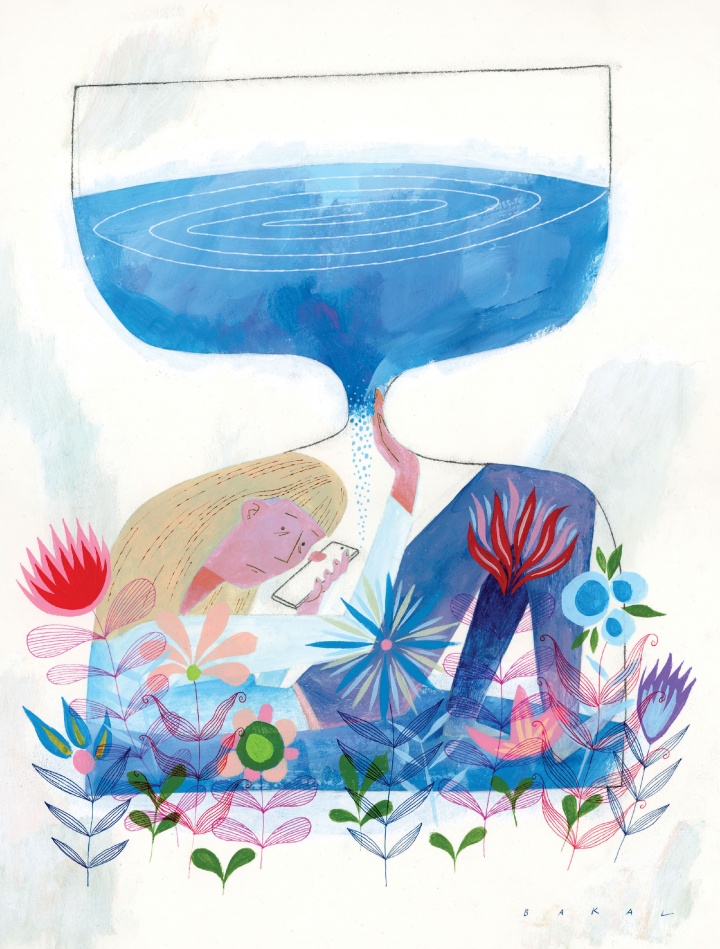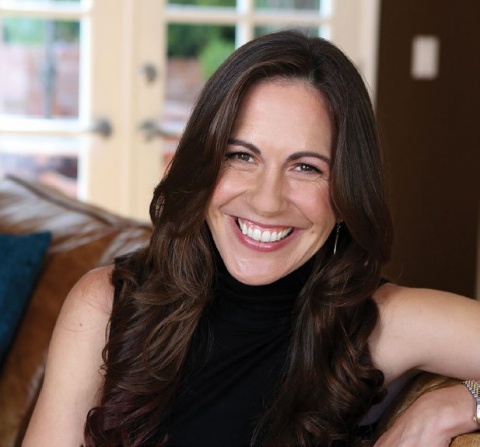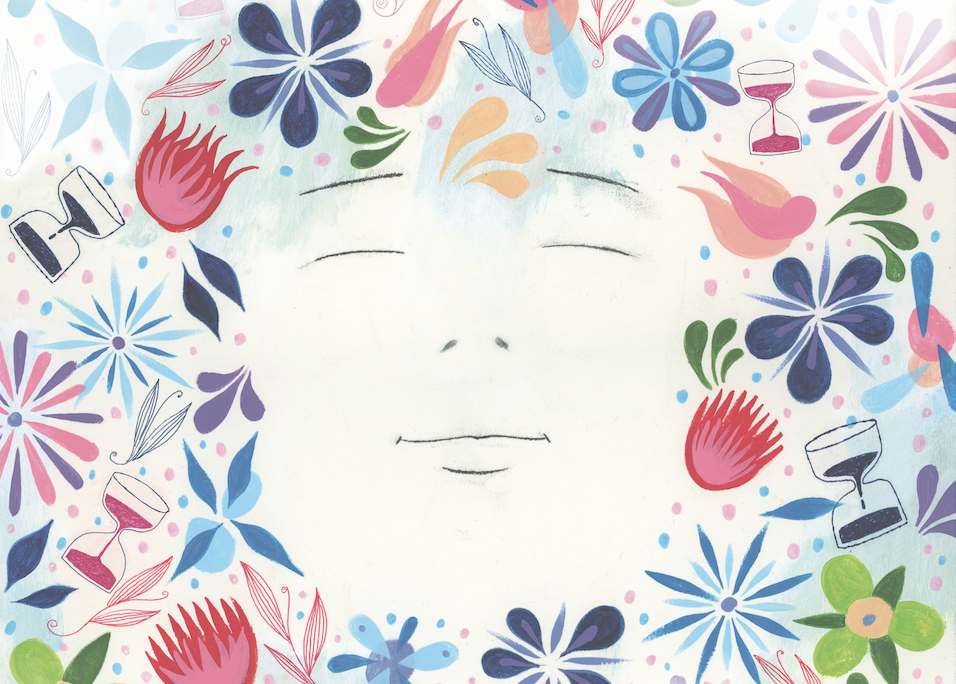Feeling the crunch? Cassie Mogilner Holmes’02 has the secret to happier days.
Columbia College | Columbia University in the City of New York
Feeling the crunch? Cassie Mogilner Holmes’02 has the secret to happier days.

Illustrations by Scott Bakal
Holmes admits that, despite this being the touchstone of her workday, “be happy” has the potential to sound, well, cheesy. The truth is anything but. Cheesiness suggests corniness or inauthenticity, a pursuit of cheap and easy feeling. Holmes, on the other hand, is genuine in her motivation and rigorously scientific in her approach. A professor of marketing and behavioral decision making, she has studied the role of time in cultivating happiness for more than a decade. She can say with empirical precision what leads to more fulfillment and, just as importantly, what doesn’t. (Hint: Put down your phone.)
Three years ago Holmes launched a course on happiness and life design that quickly became one of the most popular at UCLA’s Anderson School of Business. In it, she shares insights from her research and practical advice for better investing one’s time. But the how-to aspect is only one facet of a deeper discussion about making time more meaningful. To that end, Holmes keeps the class relatively small; intimacy is key to encouraging honest conversation, she says, and her assignments take students to some emotional places. When deciding how to apportion your hours, it helps to wrestle with weighty ideas like defining your purpose, or to hear from an elder how they wish they’d spent their days.
By now, Holmes has taught the course long enough that her earliest students report lasting change to their perspectives. They speak with the zeal of the converted, sharing how they’ve introduced more happiness into their lives in ways small and large. One started taking his dog along on afternoon bike rides; another traded her pursuit of a VP title for a freelance life in France. They have saved their class notes, revisited them when stress creeps in, passed Holmes’ advice along to family, friends, employees.
“People often have a bias when they think of business school — that it’s students who want an education so they can make a lot of money as a CEO or other business leader,” says Patricia Godefroy, Anderson’s associate dean for marketing and communications. “But there has to be an orientation to something beyond just profit, and I think this course helps get at that. It’s not only about helping students learn how to find happiness in their own lives; it’s also aimed at building a mindset around supporting other people’s happiness, and learning to value happiness, and a desire to help create that in a broader sense.”

Cassie Mogilner Holmes ’02
DIANA HENDERSON
Holmes is coming into the spotlight at a time when many of us could use a little more happy in our lives. Before Covid-19, she says, she often had to explain why the pursuit of happiness merited everyday attention. But with the experience of the last few years, our collective need for an intervention — and to approach happiness with intention — has become all too apparent: The World Health Organization has reported that the global prevalence of anxiety and depression increased by 25 percent in the first year of the pandemic.
“Nobody takes our emotional well-being for granted anymore,” Holmes says. “The pandemic has taught us that our lives are fragile and our time is finite, and everyone is trying to figure out, ‘How do I invest the hours so that they feel more meaningful?’”
Two to five hours. That’s the sweet spot between having too little and too much time, according to Holmes’ research. Less than that and we feel stressed (“time poor” is the term); more, and we risk running headlong into aimlessness — and not of the pleasantly-wandering-with-an-ice-cream-cone variety. “When we spend hours of our days with nothing to show for them, it undermines our sense of purpose and makes us less satisfied,” Holmes says.
The California native has studied happiness since around 2008, having made the leap from an initial interest in choice satisfaction while doing a marketing Ph.D. at Stanford. But one especially tough experience on the time-poor end of the spectrum sharpened her focus. It was 2013, and Holmes was traveling from NYC to Philadelphia, where she was on the tenure track at the Wharton School of Business. She’d had a day — incidentally, spent at Columbia — filled with meetings and a presentation and dinner with colleagues, capped off by a rushed cab ride to make the last train of the night. At home, her husband and 4-month-old were waiting.
“I remember looking out the window as everything was passing by so fast, and thinking, life is passing by so fast,” Holmes says. “Between the pressures of work, of wanting to be a good parent and partner, of wanting to be a good friend, of the never-ending pile of chores waiting for me at home, there was too much to do. And I didn’t feel like there was enough time to do it, let alone to do any of it well, let alone to enjoy any of it along the way.”

She considered the fantasy of quitting and moving with her family to a sunny, slow-paced island. But while most of us in that moment would shake it off and then get back to work, Holmes just got to work. As a social psychologist, she knew she had articulated a question that she and her collaborators could investigate: Are people with more free time happier?
Discovering the existence of that two-to-five-hour sweet spot suggested to Holmes that, for most people, more contentment was attainable — and the hours were already in hand. They just weren’t being used in a way that produced overall positivity.
So how to change that?
Happily, Holmes has learned a lot about how to increase our feelings of satisfaction and time affluence. And bonus: When we feel like we have time to do everything we want to achieve, we are both more confident and more optimistic. Her exercises help people home in on the activities that inspire the most happiness in their lives (cultivating social connection is a universal); inject fun or bring meaning to the meh moments (transform a subway commute by reading); and recognize the benefits that come from spending time differently (get out in nature more, or consistently sleep seven hours a night).
Crucially, Holmes also addresses ways to improve the quality of our hours. This is where putting down our phones for a digital detox — to better connect with ourselves and the world around us — is highly recommended. She also walks right up to some uncomfortable truths, including the fact that our time is limited (gulp) in the largest, most mortal sense; there’s even an assignment for calculating how many more times you might do a favorite activity. But reckoning with that reality leads us to protect time for the things that matter, as well as promotes a healthier appreciation for the everyday joys.
And about your purpose: “I know it sounds like such loaded idea,” Holmes says, “but having that in mind helps you step away from general notions of what a good life is or what success is.” In the “Five Whys Exercise,” she encourages people to ask themselves why they do the work that they do, then consider the answer and ask why it’s important, again and again, to drill down to their core motivation. “This way, it’s about, what do I ultimately care about doing and accomplishing in my life? And that helps clarify which activities are in service of that goal, and which don’t actually move you forward.”
Full disclosure: In the course of reporting, I too became a Holmes believer. With her advice in mind, I tried treating my weekend like a vacation (yes, please, to a Bloody Mary at brunch). I “bundled” my least-favorite chore, folding laundry, with listening to music to make it more palatable (thank you, Bruce!). And I started putting my phone away for a few hours every night, from when my 6-year-old arrives home to when she goes to sleep.

Speaking with Holmes’ former students, I found myself wholeheartedly identifying with their enthusiasm. Pranav Joshi, the cyclist whose beagle joins him for rides, recalled his experience with the Five Whys, which put him in touch with how much he valued contributing to community; he also realized how much he missed the volunteering he’d done as a teenager. Last summer he took a job with the education nonprofit City Year: “When I go to work now, it feels less like work and more like I’m volunteering. I’m doing something that’s kind and that I love,” he says.
Erin Rojas, a Starbucks district manager, says the lessons around sleep were the most critical. “It was always the first thing to go [when I was busy],” she says. “But you cannot make up for lost sleep; the damage to your health is already done.” Instead of five or six hours a night — “exhausted the next morning, surviving on all the coffee I have at work” — she now makes sure she gets eight hours, even if it means an 8 p.m. bedtime. “My brain is more highly functioning, I’m in a better mood. It’s one of the principles I teach my team,” she adds. “They’re leading other people, and if they aren’t taking care of themselves, they can’t show up and be their best.”
“We can control how we invest our time and prioritize our time, and how we make time for the things that matter, knowing the things that matter.”
For Ashley Caffey, a sales consultant at Bayer, the lessons had a cascading effect. “Going in, I felt like I was on a treadmill and moving for the sake of movement, without a real destination,” she says. “I had an agenda of things to accomplish each day, but how was it relevant to my life? How did it align with my purpose? These were things I didn’t understand or even give thought to for the most part.”
It all culminated in what Caffey described as a “shift in my universe and my awareness.” She confronted the fact that she hadn’t been prioritizing family as much as she thought, and now she’s more intentional about blocking off time for bonding with her kids and husband. She started scheduling it into a planner, a Holmes pro tip called “time crafting.” “I highlight it with colors — pink for time with me and my daughter, green for me and my son, purple for the whole family,” Caffey says. She laughs in an almost wondering way. The unspoken takeaway: “I can’t believe I do this. But it works.”
For many, Holmes herself is a leading source of inspiration. “She lets her own humanity and normalcy be very present,” says Shelby Chambers, another former student and the one who moved to France for better work-life balance. “She was really rooted in her research, but also approachable and candid.” In Holmes’ book, as in the classroom, she uses examples from her own life to illustrate her research points. “She shares very personal stories,” Rojas says. “And she is so passionate about her work. When she speaks you hear it — in her voice, in the way she exhibits and demonstrates all the things that she’s teaching.”
Holmes does happen to be someone who falls on the cheerier side of the personality spectrum. In her book, she confesses that her nickname growing up was Little Miss Happiness; her colleague Godefroy describes her as “a blue sky.” But Holmes emphasizes that there are three components to happiness, of which inherited disposition is only one part. A person’s situational circumstances, such as income level or marital status, also has an impact (though less than you might think). The third part, meanwhile — which essentially makes all of Holmes’ work possible — is intentional thought and behavior.
“I don’t like using the word ‘schedule,’ because then you get into this experience of time management where it’s all about efficiency,” Holmes says. “But we can control how we invest our time and prioritize our time, and how we make time for the things that matter, knowing the things that matter. And also how we minimize the spending that feels wasteful and therefore un-fun.”
The title of Holmes’ book is deliberate, she adds. She is not promising happiness, full stop, a blissful state of being without down days or hardship. She is interested in making a difference of degree, to help people feel more joy and fulfillment than they might otherwise, and also to build their muscles so they have the capacity to get through the difficult times when resilience is required.
“We have a choice in how we spend our time and how we think about our time,” Holmes says. “And that has a significant effect on happiness.”

Published three times a year by Columbia College for alumni, students, faculty, parents and friends.
Columbia Alumni Center
622 W. 113th St., MC 4530, 6th Fl.
New York, NY 10025
212-851-7852
cct@columbia.edu

Columbia Alumni Center
622 W. 113th St., MC 4530, 4th Fl.
New York, NY 10025
212-851-7488
ccalumni@columbia.edu